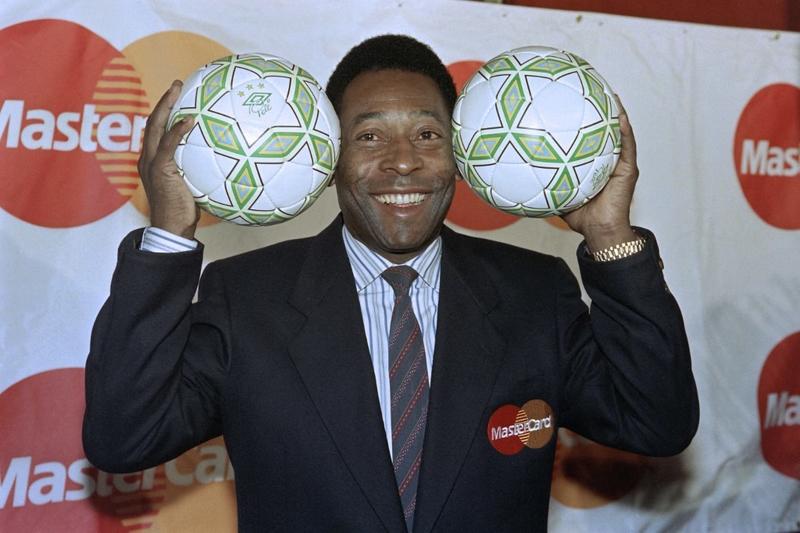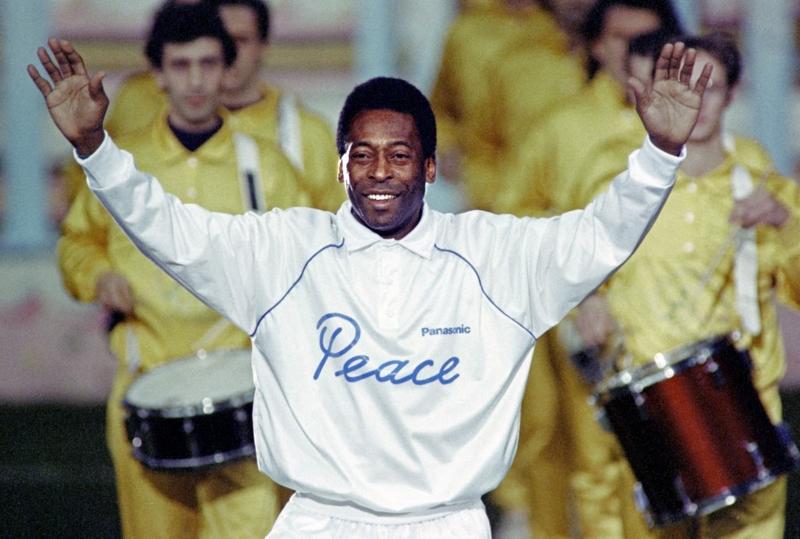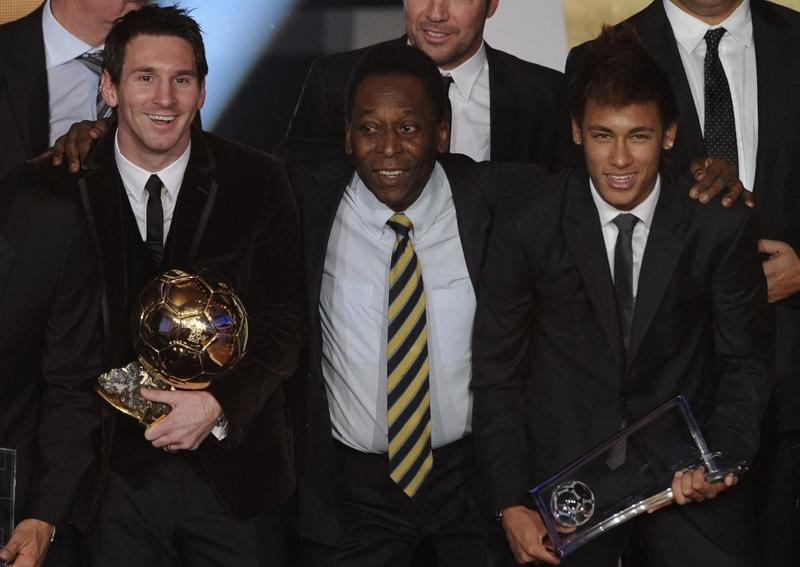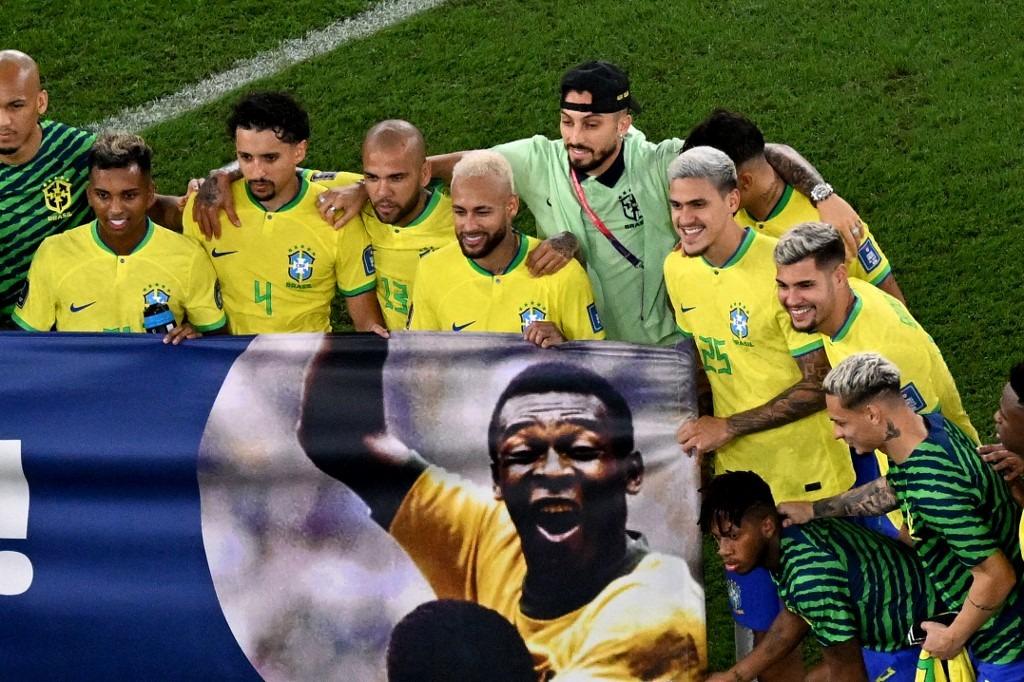 In this file photo taken on April 1, 1992, former Brazilian soccer star, Edson Arantes do Nascimento, known as Pelé (left), holds soccer balls at an appearance to promote his tie with a creit card company that is a sponsor of the 1994 World Cup, in New York. (MARIA R. BASTONE / AFP)
In this file photo taken on April 1, 1992, former Brazilian soccer star, Edson Arantes do Nascimento, known as Pelé (left), holds soccer balls at an appearance to promote his tie with a creit card company that is a sponsor of the 1994 World Cup, in New York. (MARIA R. BASTONE / AFP)
Before Pele made his debut for Brazil, the South American nation had never won the World Cup. By the time he retired, they had won three - more than any other team.
Arguably Pele's greatest contribution to both soccer and Brazil was to transform his underachieving nation into a footballing superpower.
"Pre-1958 Brazil has a rich football heritage but it was not the country of football," David Tryhorn, co-director of the 2021 Netflix documentary "Pele," told Reuters.
 In this file photo taken on Oct 31, 1990, Pele opens his arms as he acknowledges cheers from a crowd of spectators during a ceremony in Milan to celebrate his fiftieth birthday. (GERARD MALIE / AFP)
In this file photo taken on Oct 31, 1990, Pele opens his arms as he acknowledges cheers from a crowd of spectators during a ceremony in Milan to celebrate his fiftieth birthday. (GERARD MALIE / AFP)
"Post-1970 the first thing that comes to mind when we think of Brazil is football. And while there is a wildly talented double generation of players responsible for that, the unifying figure is Pele."
He remains the only player to have played for three World Cup winning teams, although his experiences in the tournament varied greatly.
ALSO READ:Soccer star Pele, Brazilian legend of the beautiful game, dies at 82
He burst on to the scene at the age of 17 in 1958, scoring six goals in the knock-out stages, including two in the final against Sweden, as Brazil recorded their first triumph.
Four years later in Chile he was injured in Brazil's second match, and Garrincha stepped up to play the starring role in Brazil's second consecutive win.
 In this file photo taken on Jan 9, 2012, Barcelona's Argentinian forward Lionel Messi (left) poses with Brazilian football legend Pele (center) and Santos FC' Brazilian forward Neymar after receiving for the third time the FIFA Ballon d'Or award at the Kongresshaus during the FIFA Ballon d'Or ceremony in Zurich. (FRANCK FIFE / AFP)
In this file photo taken on Jan 9, 2012, Barcelona's Argentinian forward Lionel Messi (left) poses with Brazilian football legend Pele (center) and Santos FC' Brazilian forward Neymar after receiving for the third time the FIFA Ballon d'Or award at the Kongresshaus during the FIFA Ballon d'Or ceremony in Zurich. (FRANCK FIFE / AFP)
Pele hoped to make it three-in-a-row in England in 1966 but Brazil were knocked out in the group stage.
After retiring from international football for two years he returned in time for Mexico 1970, determined to win the Jules Rimet trophy and go out on a high. His performances in what is often called the greatest team of all time capped his international career.
He was supported by an ensemble cast. Rivellino's bending free kicks, Jairzinho's record of scoring in all seven games of the finals, and captain Carlos Alberto's glorious fourth goal in the final against Italy were all unforgettable to an audience watching a World Cup broadcast live and in colour for the first time.
But it was Pele, already widely held to be the greatest player of all time, who truly captured the imagination.
 Brazil's players hold a banner dedicated to banner Brazilian football legend Pele at the end of the Qatar 2022 World Cup round of 16 football match between Brazil and South Korea at Stadium 974 in Doha on Dec 5, 2022. (ANTONIN THUILLIER / AFP)
Brazil's players hold a banner dedicated to banner Brazilian football legend Pele at the end of the Qatar 2022 World Cup round of 16 football match between Brazil and South Korea at Stadium 974 in Doha on Dec 5, 2022. (ANTONIN THUILLIER / AFP)
The audacious shot from the halfway line against Czechoslovakia, the outrageous dummy that bamboozled the Uruguayan goalkeeper, and the amazing header turned round the post by Gordon Banks all went down in history.
None of those chances resulted in goals, but even when he didn't score his invention shone through, cementing the image of the Brazilian footballer as the world's most creative player and Brazil as the spiritual home of what would forever be called "the beautiful game".
"Brazil's performance in the World Cup final of 1970 was a masterclass," said the late England goalkeeper Banks. "On that day Brazil firmly planted their flag on the summit of world football, a peak to which all other teams must aspire."


